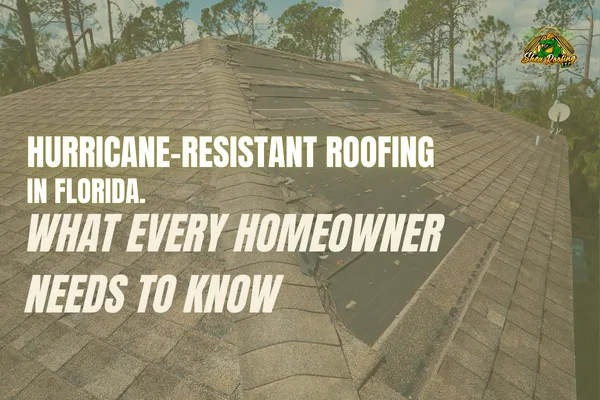
Hurricane-Resistant Roofing in Florida: What Every Homeowner Needs to Know
Hurricane-Resistant Roofing in Florida: What Every Homeowner Needs to Know
Living in Southwest Florida means enjoying sunny skies and coastal beauty—but it also means preparing for hurricane season every year. In cities like Punta Gorda, Cape Coral, and Naples, your roof is your home’s first line of defense when storms hit.
Choosing a hurricane-resistant roof in Florida isn’t just about peace of mind—it can also impact your home’s safety, insurance eligibility, and long-term costs.
In this post, we’ll break down the best roofing systems for hurricane resistance, how they perform in Florida’s unique climate, and what you need to know before replacing your roof.
Why Hurricane-Resistant Roofing Matters in Southwest Florida
Florida sees more landfalling hurricanes than any other U.S. state. From Category 1 storms to major hurricanes like Ian, roofs here must be able to:
Withstand wind speeds up to 150–180 mph
Resist wind-driven rain and flying debris
Remain intact even when surrounding homes fail
Florida Building Code (FBC) has some of the strictest roofing standards in the country—and for good reason.
But not all roofing materials are created equal when it comes to wind and storm protection.
Top Hurricane-Resistant Roofing Materials
Below are three roofing systems that perform best during hurricanes, based on studies from the Insurance Institute for Business & Home Safety (IBHS) and the Tile Roofing Industry Alliance.
1. Metal Roofing
Metal roofs are among the highest-rated for storm performance.
Wind uplift resistance up to 160–180 mph, depending on system
Interlocking panels shed rain efficiently
Available in 5V crimp and standing seam styles
Fire-resistant, low maintenance, and long-lasting
🛠️ Standing seam metal roofing is preferred for high-wind zones due to hidden fasteners and fewer weak points compared to 5V panels.
2. Concrete and Clay Tile Roofing
Tile roofing is common in upscale Florida homes and coastal areas.
High wind resistance when properly installed (150+ mph)
Individual tiles can break, but rarely compromise the whole system
Heavy weight helps prevent uplift during high winds
Supported by manufacturers like Westlake Royal, Eagle Roofing, and Crown
🔍 According to the Tile Roofing Institute, many tile systems meet Miami-Dade County’s hurricane testing standards, which are the strictest in the nation.
3. Architectural Asphalt Shingles (High-Performance Grades)
While not as strong as metal or tile, modern shingles can still meet FBC standards.
Rated for wind speeds up to 130–150 mph (with enhanced nailing patterns)
Less expensive than tile or metal
Quick to install and easy to repair
Tip: Always choose Class 4 impact-rated shingles and verify that they’re tested under ASTM D3161 or D7158 standards for wind resistance.

Important: Insurance & Roof Age in Florida
Even a well-maintained, storm-resistant roof may need replacement solely due to age.
Florida insurance providers often require full roof replacement after 20–25 years, regardless of how the roof looks or performs.
What You Should Do:
Review your homeowner’s insurance policy for roof age limits
Schedule an inspection before storm season
Document any damage immediately after storms
Understand that coverage could be denied even if the roof still “looks fine”
🧠 This rule applies even to tile and metal roofing systems with potential 40+ year lifespans.
Extra Hurricane Protection Tips
Even the strongest roof needs support. Here’s how to further protect your home:
Use hurricane straps or clips to secure your roof to wall framing
Seal roof decks with secondary water barriers
Ensure ridge vents, soffits, and flashing are properly installed
Trim overhanging branches and secure loose exterior objects
Final Thoughts
A hurricane-resistant roof in Florida is a smart, long-term investment—not just for protection, but also for energy savings, insurance benefits, and resale value. Whether you choose metal roofing in Punta Gorda, tile roofing in Naples, or high-performance shingles in Cape Coral, the key is proper installation and compliance with the latest building codes.
Need Professional Help?
Not sure which roofing system fits your budget, home style, and storm zone?
At Shea Roofing LLC, we’ve helped hundreds of Florida homeowners choose and install roofing systems that meet or exceed hurricane standards. Whether you need an inspection, quote, or advice on your next roof replacement—we’re here to help.
📞 Contact us today to schedule a consultation and protect your home before the next storm hits.

